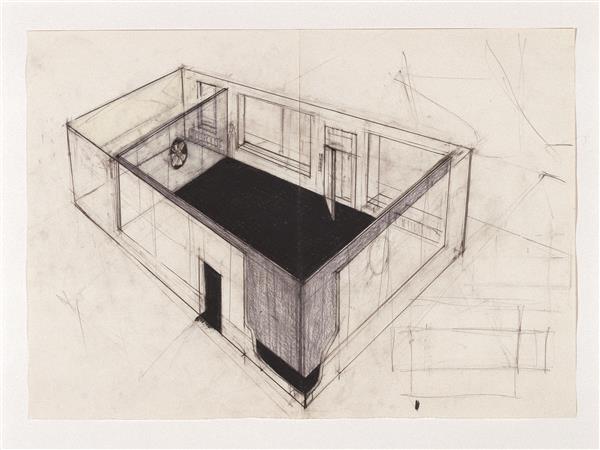Nicolas IX
Christoph Meier
black-and-white offset print on neon paper, foam, ink, acrylic and varnish
83 × 61 cm
2013
Acquisition 2014
Inv. No. 0271
A sculpture has to be erect, and when it canʼt do it by itself, it gets a stand. The sculptures Nicolas VII and Nicolas VIII are made of foam and need one. Nicolas VIII is now even rolling.
Somehow one is a bit clueless about how to behave with these works – one almost wants to hug them and see what happens. Or perhaps really use them as stamps, as Christoph Meier suggests in the paper piece Nicolas IX.
It is clear to see with both sculptures that they have already been through something. To start, the material that they are made of doesnʼt really fit in the average catalogue of art supplies. The foam rollers might have been boxing bags for sensitive children, and the stand a fixture for cruel dentist drills. Similarly, the work-methods are not really the usual thing – the paint isnʼt simply layered with a brush on the foam, as a painter does, rather the pigments are slowly massaged into the body, in a way that is more familiar in the kitchen. The material has to be handled until so much color has penetrated that it actually could serve as a stamp and leave marks behind. Incidentally, Christoph Meier has concentrated for a long time on copy and reproduction processes and manipulates the respective copy-medium – a Xerox-machine, for example, or a stamp in the case of the sculptures – so much that the reproduction method never yields an identical output. As a result, the border between counterfeit and copy has to be newly conceived.
Meier shows himself to be just as flexible in his choice of titles. When a curator requested political reflections, he quickly titled the works Nicolas, naturally as a play on the former French president, but more as a commentary on the art community, that makes work more banal rather than politically charged through such similar, simplistic methods.
Christoph Meier belongs to the younger generation of sculptors that have replaced classical composition methods with contingency when developing their work. It is less about following a carefully devised plan about how the sculpture should eventually look – rather it is about good navigation, using accidents wisely and stopping at the right moment. The development process is a central part of the work and leaves a distinctive mark.
Markus Schinwald, 2015 (translation: Virginia Dellenbaugh)
Continue readingPublications
evn collection. 95–2015 Jubilee, Vienna 2015, p. 270–275
